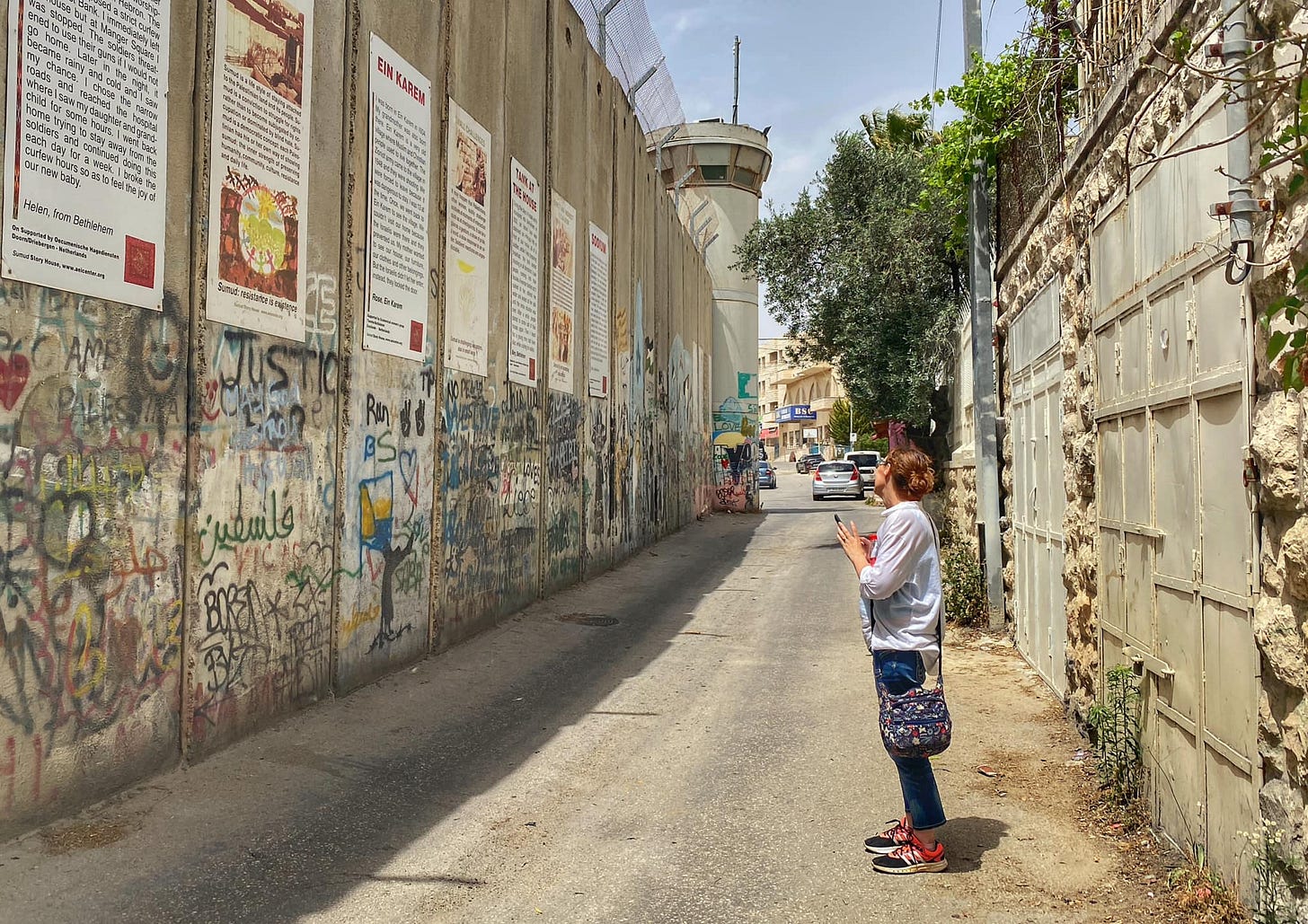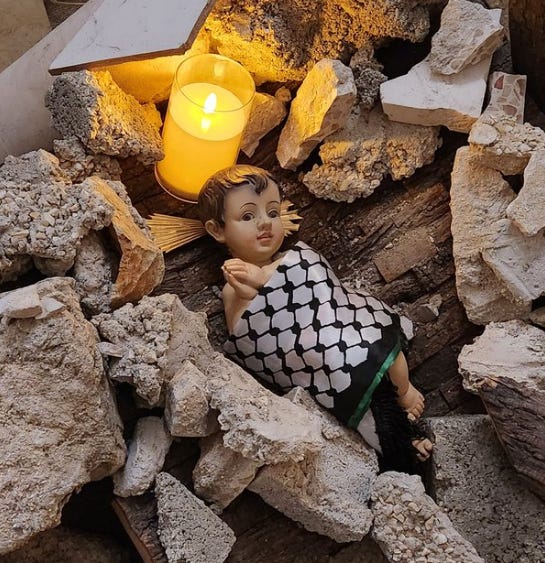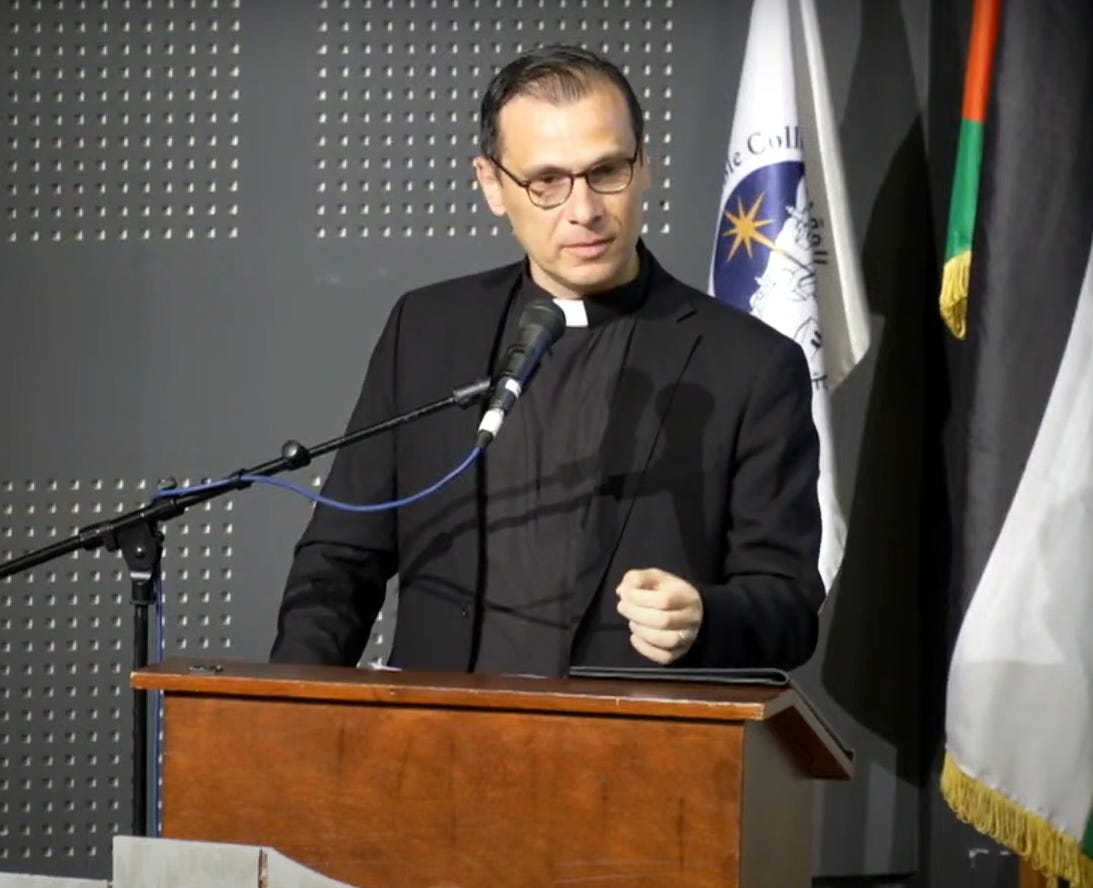Stories from the Other Side of the Wall: Munther Isaac
“Tell people our story.” Shireen Awwad, Bethlehem Bible College
This is an excerpt from one of Reverand Dr. Munther Isaac’s lessons at the Christ at the Checkpoint conference. The story that I want to focus on is toward the end in italics, but the whole section is provided to give context.
I said in one of my talks in London, Jesus did not say, "I was hungry and you prayed for me," or "I was hungry and you made a statement." He said, "I was hungry and you gave me." Here, he says, "You set me free."
This takes me to my third passage. Everyone who follows what I've been saying and doing knows that Matthew 25 has shaped a lot of my thinking. It is a passage that challenges us, especially evangelicals, if we take it seriously. Please don't try to theologize it. Take it for what it is. Don't try to reconcile it with the doctrine of justification by faith alone or with 16th-century discussions in Europe. Take it for what it is.
This message is as straightforward as it can be: God will judge us based on what we have done to the least of these. It can't get any more straightforward. Please don't try to say, "Well, you know, fruits first, you believe, then the results." Please don't. Take it for what it is. Be a literal Christian, a fundamentalist Christian. You never expect to hear this from me, but take it for what it is.
The righteous will answer him, saying, "Lord, when did we see you hungry and feed you, or thirsty and give you drink? When did we see you as a stranger and welcome you, or naked and clothe you? When did we see you sick or in prison and visit you?" The King will answer them, "Truly, I say to you, as you did it to one of the least of these my brothers, you did it to me."
Jesus here challenges us to see his image in all those we meet who need our support, solidarity, and action. He clearly says this is the basis of God's judgment. For the ones he says, "Depart from me, you cursed, into the eternal fire prepared for the devil and his angels," no one likes to talk about these things. This is one of my points. I've never preached about judgment as much as I have these last eight months. Actually, judgment here can become good news, but we don't talk about it. Judgment is important.
"Depart from me"—this is strong language, friends. Why? Because "I was a stranger, and you did not welcome me." They ask, "When did we?" It’s very clear. "I say to you, as you did not do it to one of the least of these, you did not do it to me." Again, can it get any clearer? I don't think so. Do we really take seriously the teachings of Jesus?
For years, we focus so much on the benefits we get from Jesus, forgetting that Jesus actually calls us to follow him. We just want the good things he gives us. We focus on the blessing, on what he gives us, especially if it's eternity. We forget that the thing Jesus emphasized the most when he was here was, "Follow me."
What does following Jesus mean? Walking in his footsteps, doing the things he did. This is why, for years, I've been critical of all these pilgrimages promoted as walking in Jesus's footsteps. Have you been on one of these? You come to our land and do nothing Jesus did, but somehow you model it as walking in the footsteps of Jesus. I read the gospel, and correct me if I'm wrong, but I don't see Jesus hopping from one bus to the other and visiting old buildings.
To walk in Jesus's footsteps is to do the things Jesus did and, more than that, to deny ourselves the way Jesus did. Didn't he say it? If you want to follow me, deny yourself. Oh my goodness, if I look at the way we, especially Christian pastors—I'm preaching to myself here—we love ourselves. We create ministries in our name. We love to lift ourselves. Jesus told us if you want to follow him, deny yourself. It's not about you. It's about others, about the people we serve. It's about the calling to embody the kingdom of God towards others. Jesus modeled that way for us so that we continue the path after he leaves.
What have we done? We've made it about the good stuff we get from Christianity. Christianity has become the faith of the privileged rather than a call to be in solidarity with the poor and marginalized. This passage, as I said, challenges us to see the image of Jesus in those we encounter, especially those who need our active call and act of solidarity.
This is the main reason among many why I put Jesus in a kufiya. Honestly, we were broken by one leader after another, politician and church leaders justifying and rationalizing the killing of Palestinian children in Gaza. We wanted to reclaim that humanity and see Jesus in every child pulled from under the rubble. Among the many stories I can share is one diplomat who asked why I hadn't wrapped Jesus in an Israeli flag because children were killed on October 7th.
Of course, we definitely lament the killing of children on October 7th. Every child is precious; every life is precious. We can't accept that [killing of children]. But this is what I told him. In one day, 37 precious lives were killed on October 7th, children among the 1,200 Israelis who were killed. The whole world stopped and came to Tel Aviv to show support. We've seen the Israeli flag on the Eiffel Tower, Berlin Wall, you name it. I said, "It's been months, every day Palestinian children are killed. I haven't seen the Palestinian flag on the Berlin Wall. Are we less worthy? Are we less human?"
I said, "While you and your government dehumanize Palestinian children, it's my call to share their worth and dignity. This is why I have Jesus in a kufiya." By the way, no one objects that in the very same church where I preach, we have a very nice window with a blond Jesus with colored eyes. No one objects, but the idea of a Palestinian Jesus is somehow scandalous, right?
"As you did to one of the least of these my brothers, you did it to me." You can't imagine how important and powerful those words were for us when the images of the 18 tombs in white were laid in front of the church in Gaza. The priest praying—we were so broken by those images. I couldn't help but think of that verse, "To the least of these, you have done to me." Jesus called, "Come to me, you little ones, and I will give you the kingdom of God." We were tired of the dehumanization of the Palestinian people.
This passage also reminds us that judgment is real. Sometimes judgment is good news. I'm happy there is judgment because we need to be accountable for what God has given us. This passage challenges the way we have thought about salvation, eternity, and judgment. You lift your hand, and you're saved, and all is well. No, friends. Let's take this passage seriously. Let's allow it to continue to challenge us day after day.




